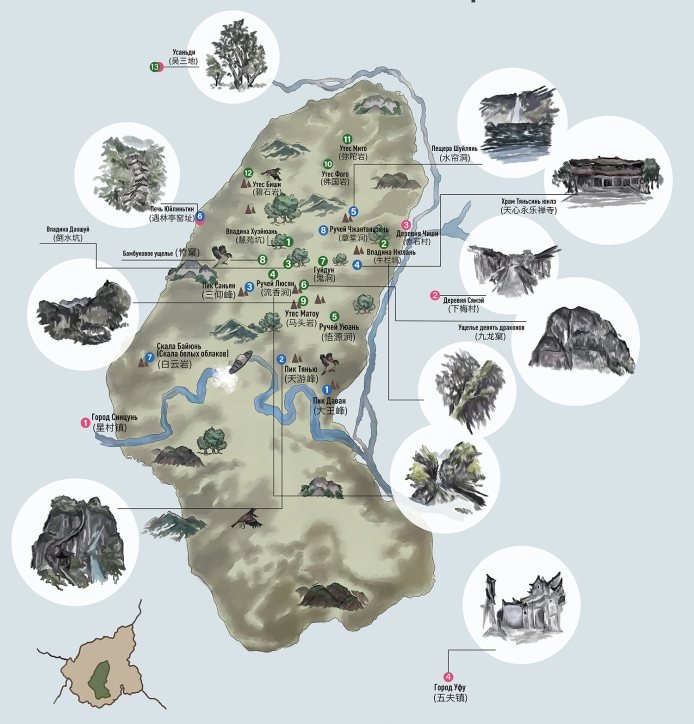-
0 Saturation
-
0 Aftertaste
-
0 Aroma
-
0 Effect
-
0 Balance
-
0 Body
Bai Jiguan ( White Cockscomb ) is a cliff tea grown in the amazing and truly heavenly Wuyi Mountain Nature Reserve. It belongs to the "Four Great Bushes" (Chinese: 四大名欉, pinyin: sìdà míng cóng) of the Wuyi Mountains. The other three teas from the "Sida Ming Cun" are Da Hong Pao, Shui Jingui, and Tie Luo Han. Modern tea masters claim that Bai Jiguan significantly surpasses other cliff teas in flavor and aroma, even those like Da Hong Pao. The tea plantations are located in northern Fujian Province, where the Wuyi Mountain Nature Reserve is located. An ancient Chinese proverb says, "Great tea is born from crystal clear water and mighty mountain peaks." And all this is truly true, as the most delicious and aromatic teas grow in mountain valleys and are brewed with only the purest water.
Mount Wuyi is one of the ancient cradles of tea culture, and it's here that Bai Jiguan oolong tea grows. The mountain's volcanic soil is poor in nutrients but rich in natural minerals. This provides ample nourishment for tea. Consistent moisture and adequate rainfall also play a significant role. The tea bushes grow very slowly, and this oolong is produced in small quantities, making it quite expensive. The leaves are pale green, with a lot of white in the green. The buds are curved and shaggy, reminiscent of the comb on the head of a golden pheasant or rooster. This may be where the name comes from. During the Ming Dynasty, there was a story about how " Cock's Comb " cured a nasty disease, which led to its popularity.
Tea is harvested by hand, just as it was centuries ago. Pickers begin their work in early April and continue until the end of May; it's very difficult and poorly paid. Then, along narrow, impassable paths, the tea is carried in large baskets to the foot of the mountain, where the tea factory is located. I process the tea according to ancient Chinese recipes and with great care, without unnecessary fuss or rush. After all, high-quality tea must age, like fine wine.
There's a legend about the name of this oolong. Many centuries ago, a monk saw an eagle attacking a child, while a rooster defended the child. In the unequal battle, the rooster died, but the child was saved. In gratitude, the monk buried the rooster on Mount Wuyi, and a few years later, a tea bush grew on the site of the grave and was named White Rooster Comb (Bai Ji Guan), in honor of the brave rooster.
Sometimes this tea is written as Bai Ji Guan, and translated as "White Rooster" or " White Rooster Comb" .
First published on March 24, 2015.
Copyright © Chaline.Ru
The tea consists of large, light-brown and yellow leaves twisted lengthwise. It has a unique, very pleasant aroma. The infusion is clear and light yellow. The flavor profile is incomparable to other Wuyi oolongs—subtle and fluid, with woody and fruity notes, slightly tart and refreshing. Empty chahai smells like birch sap. A noticeable aroma lingers on the teeth and palate when swallowed. The tea clears the mind and leaves a feeling of lightness and invigoration.
|
Name in Chinese
|
白鸡冠 |
|
Pinyin
|
bái jīguān |
|
Translation
|
White cockscomb |
|
Country
|
China |
|
District
|
Wuyi Mountains |
- Reviews
- Vkontakte
The Wuyi Mountains, and shan, as is known, is translated as "mountain" or "mountains", are located on the border of the provinces of Fujian and Jiangxi. This is a mountain range located on an area of about 1000 square kilometers. The highest point is Mount Huanggangshan, 2158 meters high, which is included in the UNESCO World Cultural Heritage, both for cultural and natural criteria.
















































































